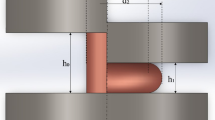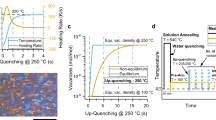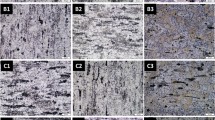Abstract
AT the suggestion of Prof. J. Reekie of the University of Toronto, I have carried out a few experiments on the cold working of aluminium at room and liquid air temperatures. These show that although the metal is spontaneously self-recovering during cold working at room temperatures, it shows lattice distortion effects if the plastic deformation is carried out at the temperature of liquid air and the specimen is maintained at that temperature. The aluminium used was ‘H.S.' brand, supplied by Messrs. Johnson Matthey and Sons, Ltd. The X-ray back-reflexion method was chosen for investigation of lattice distortion.
This is a preview of subscription content, access via your institution
Access options
Subscribe to this journal
Receive 51 print issues and online access
$199.00 per year
only $3.90 per issue
Buy this article
- Purchase on Springer Link
- Instant access to full article PDF
Prices may be subject to local taxes which are calculated during checkout
Similar content being viewed by others
References
Wood, W. A., Proc. Roy. Soc., A, 172, 231 (1939).
Author information
Authors and Affiliations
Rights and permissions
About this article
Cite this article
HUTCHISON, T. Cold Working of Aluminium at Low Temperatures. Nature 162, 374–375 (1948). https://doi.org/10.1038/162374a0
Issue Date:
DOI: https://doi.org/10.1038/162374a0
This article is cited by
-
X-Ray Line Broadening in Cold-worked Metals
Nature (1948)
Comments
By submitting a comment you agree to abide by our Terms and Community Guidelines. If you find something abusive or that does not comply with our terms or guidelines please flag it as inappropriate.



